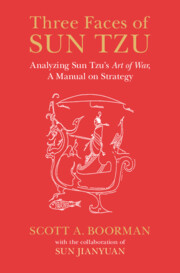Book contents
- Three Faces of Sun Tzu
- Frontispiece
- Three Faces of Sun Tzu
- Copyright page
- Contents
- Figures
- Tables
- Acknowledgments
- Author’s Note on Chinese-Language Romanization
- Author’s Note on Chinese Characters
- Author’s Note on Online Annex
- Chronology of Chinese History
- List of Abbreviations for Frequently Cited Works
- Introduction
- Background: Historical and Textual
- Preliminaries
- A Strategist Should Be Calculating
- B Strategist Should Be Cheap
- C Strategist Should Find Advantage
- D Strategist Should Enact Stratagems and Formlessness
- E Strategist Should Make a Situation’s Natural Dynamics Work for Her
- F Strategist Should Have an Accurate Grasp of the Significant Information
- G Strategist Should Manage the Interfaces
- Conclusion
- Index A
- Index B
Introduction
Published online by Cambridge University Press: 07 March 2024
- Three Faces of Sun Tzu
- Frontispiece
- Three Faces of Sun Tzu
- Copyright page
- Contents
- Figures
- Tables
- Acknowledgments
- Author’s Note on Chinese-Language Romanization
- Author’s Note on Chinese Characters
- Author’s Note on Online Annex
- Chronology of Chinese History
- List of Abbreviations for Frequently Cited Works
- Introduction
- Background: Historical and Textual
- Preliminaries
- A Strategist Should Be Calculating
- B Strategist Should Be Cheap
- C Strategist Should Find Advantage
- D Strategist Should Enact Stratagems and Formlessness
- E Strategist Should Make a Situation’s Natural Dynamics Work for Her
- F Strategist Should Have an Accurate Grasp of the Significant Information
- G Strategist Should Manage the Interfaces
- Conclusion
- Index A
- Index B
Summary
Often regarded as the oldest surviving work on strategy, the Sun Tzu text has influence in many quarters today. This study organizes Sun Tzu’s ideas under fourteen thematic headings. It also clarifies Sun Tzu’s limitations and blind spots. Building on Brigadier General Samuel B. Griffith, USMC (Ret.)’s translation, this study analyzes Sun Tzu from three standpoints: Sun Tzu (1), Sun Tzu’s ideas in their original Warring States Chinese context; Sun Tzu (2), Sun Tzu’s ideas applied to warfare in a military sense in other times and places; Sun Tzu (3), generalizations of those ideas, including to cyber warfare and other twenty-first-century strategic competitions. Whereas Sun Tzu (1) analysis addresses ways in which the text is a product of its times, intertwined with traditional Chinese cultural milieux, Sun Tzu (2) and (3) analyses, often building on analogical thinking, map universalistic aspects of Sun Tzu’s insights into war and conflict, strategy, logistics, information, intelligence, and espionage. Those analyses also identify ways in which Sun Tzu’s thinking has relevance to gaining strategic advantage in twenty-first-century conflicts.
- Type
- Chapter
- Information
- Three Faces of Sun TzuAnalyzing Sun Tzu's <i>Art of War</i>, A Manual on Strategy, pp. 1 - 22Publisher: Cambridge University PressPrint publication year: 2024



